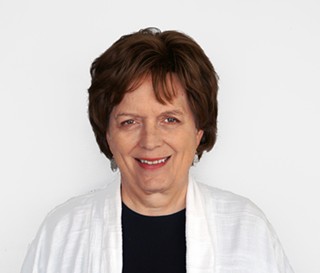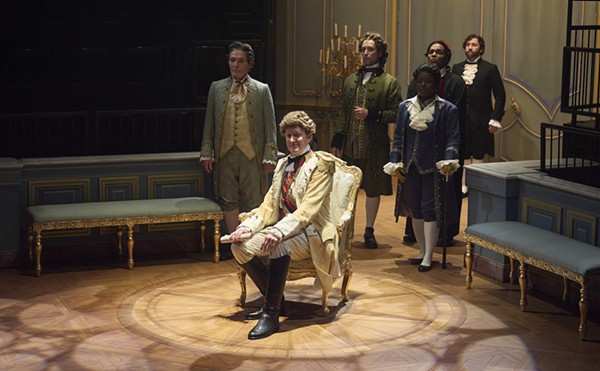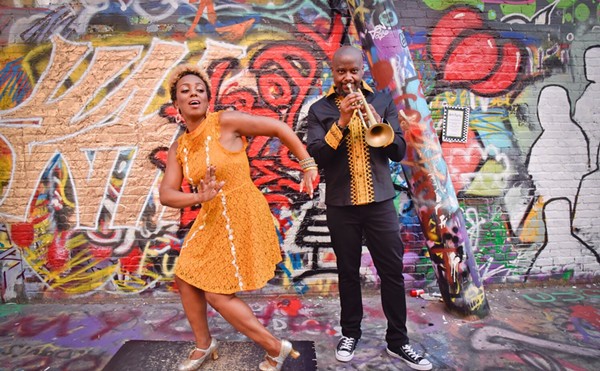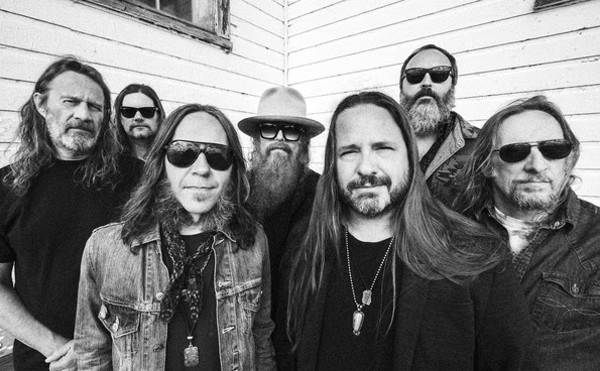There is no worse enemy than a former friend. A friend knows your weak spots and intuitively senses how to manipulate those vulnerabilities to torture you. This dynamic underlies Karamu's current world-premiere run of Before I Die: The War Against Tupac Shakur.
The lethal friendship in question is between Tupac Shakur and Christopher Wallace a.k.a. Biggie Smalls or the Notorious B.I.G., the two kings of hip-hop in the mid-1990s. At one time an opening act for Tupac, Smalls had evolved into the iconic East Coast MC, at war with the dominant West Coast rap embodied by Shakur.
Written by Karamu playwright in residence Michael Oatman, Before I Die does a lot of self-conscious throat-clearing in the first half of its 90 minutes. But once Tupac and Biggie meet face to face, the humor, tragedy and absurdity of their conflict sends showers of sparks all over the stage.
Set in a sterile Las Vegas hotel penthouse two days before his drive-by assassination, Shakur seems like a caged panther prowling his pristine but confining lair. Accompanied in his bedroom by Charlene, a svelte but no-nonsense lawyer who is in town for a convention, Shakur is obsessed with arranging a meeting with Smalls so they can tamp down their bicoastal blood feud.
Oatman's script does a nice job of establishing Shakur as a rap star who is beset by a fierce and restless intelligence (he devoured books like they were the hottest drug on the market). From railing about the fact that hip-hop didn't create misogyny to crafting a pun about "a Pac on all their houses," we see how this songwriter's mind works in subtle and interesting ways.
But early on, the structure of the play feels awkward. Shakur sometimes addresses the audience directly and then engages in dialogue with Charlene and his promoter Marion "Suge" Knight. This format might work if there was less obvious self-analysis and forced introspection. In one of Shakur's first speeches to the audience, he whines, "You give and give," sounding more like a guilt-spewing Jewish mother than a rogue rapper.
As Shakur, Jerome Anderson has the look and attitude firmly in place, and he negotiates these loose opening scenes as smoothly as possible. He is helped immensely by a quietly fierce Jeannine Oliver as Charlene and smoldering Steve Acy as Knight.
However, it is all prelude to the entrance of Biggie Smalls, played to hilarious and ominously dangerous perfection by Mike Brown. Speaking quietly in a slightly congested twang, Brown turns Smalls into a force that can easily match the random intelligence of Anderson's Shakur.
Here, Oatman and director Hassan Rogers hit their stride. Smalls casually squelches Shakur's rants before they even start, claiming with some accuracy that Shakur has too much going on in his brain, including conspiracy theories. At one point, Smalls says, "You're the only nigga I know who can start a rumor and 20 minutes later be convinced by it."
This extended interchange is so fine, it makes one long for a different first half, in which we could have learned more about each of these compelling individuals — not to mention their controversial and often socially significant music.












